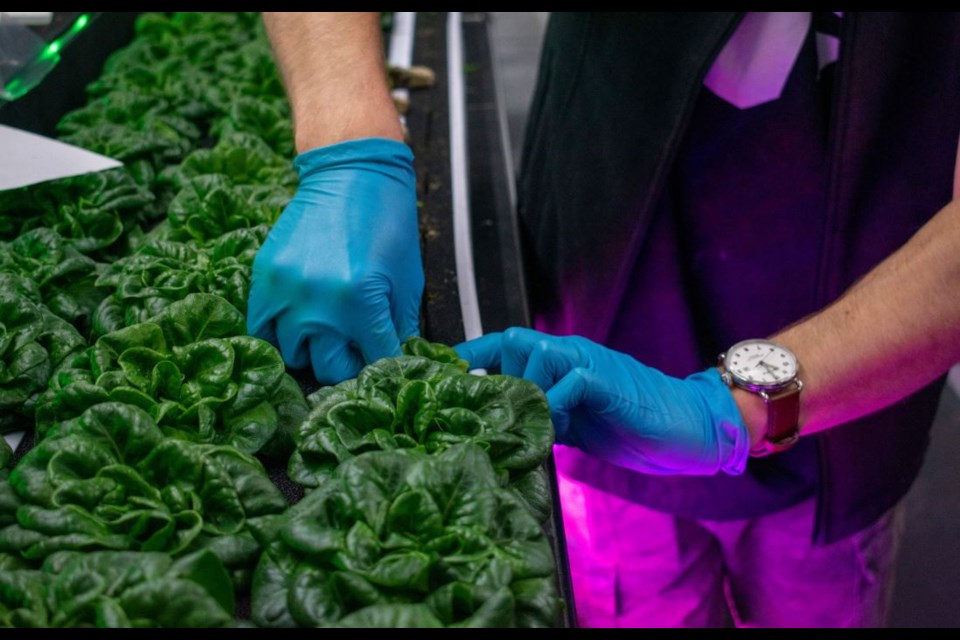LAKELAND - A national lettuce shortage caused by supply chain issues brought on by disease and drought is leaving grocery store shelves empty and driving up costs for limited varieties.
Many Lakeland grocery stores that rely on lettuce stocks from large-scale international producers in California, where the crisis is ongoing, are affecting the local shortage. At Your Independent Grocer’s operator and owner, Bill Britton, says cost, quality and availability have all impacted the Lac La Biche store.
“About a month and a half ago we started seeing a shortage, undersized products, and quality issues. Prices have now increased to over a couple hundred dollars a case on some varieties of lettuce,” he says, which is a decision not made by his store.
“It’s important to know that none of those cost increases are happening here in-store… it’s nothing that’s driven locally, and it’s not something we have control over either.”
With a few green/red leaf lettuce varieties supplied by some Ontario and Alberta pod growers, there is some supply available, but the leafy green section in the produce aisle is quite bare.
“Romaine, Iceberg and some Boston lettuce and green/red leaf varieties are hard to get now… but supply is still OK on most bagged or prepared varieties of lettuce, but not great,” he explains.
Britton says regular lettuce shipments should return in the “second week of December,” after the Thanksgiving holiday in the US.
Additionally, some cruciferous vegetables have been “undersized and overvalued” this season and not as big as consumers are used to, he said.
Off the menu
For one Lac La Biche Restaurant that is still on the fence about following suit with many regional restaurants that are removing lettuce from their menus altogether, the decision might become a forced reality. Saikat Chatterjee, Costa Cafe Seafood & Steakhouse owner, said a recent bulk purchase for a 24-package of romaine lettuce cost him almost triple the usual price.
“It’s too much. Two weeks ago, it was $63-65 a case and it’s $150” for the same amount,” said Chatterjee.
Future sustainability
But the situation is not all bleak. A local hydroponic produce farm based in Cold Lake is aiming to combine technology, space, science and controlled growing environments to create sustainable produce options in the region.
Fresh Farms Inc. is a joint family venture that started during the pandemic. The business is a partnership between three new entrepreneurs, and demand for products has increased in November as shortages grow, said Michelle Podoleski, sales and marketing lead.
“We kind of quadrupled our traffic and our sales this past week in comparison to what it was” as the local need grew during their regular 12-3 p.m. Saturday operation near the Cold Lake Marina.
The hydroponic vertical farm primarily supplies leafy green lettuce varieties and herbs grown in a “320 square-foot modular container,” which is the “equivalent of about 3.5 acres of traditional farmland,” she explains.
Community service
As their business grows, Podoleski, along with Chief Farmer/engineer Jake Lasure and Managing Director Brandi Lasure, have been assessing the viability of indoor farming, while also learning on the go. Through trial and error, they have been able to successfully support their dream, amid global food challenges.
“We’re really wanting to take charge of localizing our own food economy. I think over the last few years we realized how vulnerable we are, given the pandemic, the weather, events that are happening around the world, contamination of crops, and how that's having a direct impact on us,” said Podoleski.
Focused on sustainability and the secluded growing environment’s temperature and pH, which is monitored through an application, product prices at Fresh Farms Inc. have been comparable to retail stores.
“We're going by ounce and being comparable to what you would find in the store,” she says, charging $5 per oz. for standard romaine and roughly $6 for artisan varieties. Eventually, with more additions and improvements, they hope to become more efficient with energy use, product size, and price indexes, she adds.
In the future, Fresh Farms Inc. hopes to expand their thousands of seedlings and growing plants - which sees up to 1,000 plants harvested week - to serve the entire Lakeland community.
“There are a lot of logistics to sort out, but I think everyone is just excited to all partner up and work together and kind of take everything back into our own hands and not be so vulnerable," said Podoleski.
Future of food
Currently, Fresh Farms Inc. is the only vertical hydroponic farm in the Cold Lake area, and the goal is not to replace farming, but work in complement to the agricultural industry - especially at times when there are shortages of food products.
While unsteady and challenging weather is impacting food quality and availability globally, indoor agriculture in modular containers can provide security, says Jake.
"They’re designed for it - to bring produce in hard agriculture areas… I believe it's definitely the future. I believe this is how farming is going to go with the technology. It’s just very exciting.”



